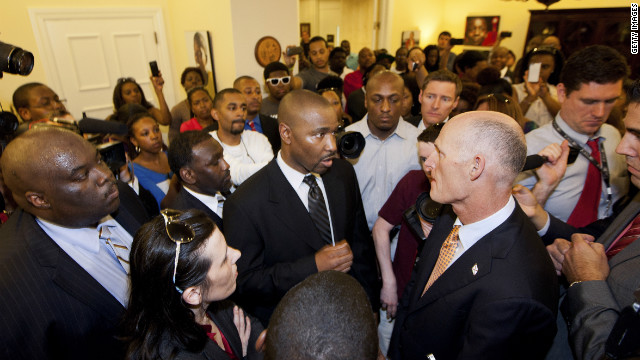STORY HIGHLIGHTS
- Jeffrey Bellin: Until recently, Florida's self-defense law included a "duty to retreat"
- In 2005, Florida overrode law enforcement objections, adopted a "stand your ground" rule
- Bellin says that even on a sidewalk, people may defend themselves with deadly force
- He says "Stand your ground" may ultimately decide outcome of Trayvon Martin shooting
Editor's note: Jeffrey Bellin,
an assistant professor of law at Southern Methodist University Dedman
School of Law, formerly served as a federal prosecutor in Washington,
D.C.
(CNN) -- The tragic killing of Trayvon Martin and
the initial decision by the police not to arrest George Zimmerman for
that killing have focused public attention on Florida's "stand your
ground" law.
According to police,
Zimmerman claims self-defense, but many observers can't understand how a
grown man with a gun can plausibly claim that he was forced to kill a
teenager armed only with some candy.
If that's the law of self-defense in Florida (and elsewhere), these observers argue, the law needs to change.

Jeffrey Bellin
The law of self-defense
is at its core about reasonableness. If a person reasonably perceives a
serious threat of harm, and uses reasonable force to meet that threat,
the law justifies even deadly force, and it does so even if it turns out
that the perceived threat was illusory.
People have differing
views of what's reasonable and, as a consequence, self-defense laws
(which vary by jurisdiction) have always attempted to further define the
concept. Until very recently, Florida's definition of reasonableness,
as in many states, incorporated a longstanding principle, the "duty to
retreat."
This principle required
that someone who found themselves in a violent confrontation had to try
to defuse the situation and retreat "to the wall" before resorting to
deadly force.
In other words, deadly
force was only permitted as a last resort. The basic idea was simple: If
more people backed down, retreated or stepped aside, fewer people would
be killed.
The "duty to retreat"
also made it easier for prosecutors to prove that a killing was not in
self-defense. The facts that can be proven are often murky (particularly
when of the two people who know what happened, one is the defendant and
the other is dead) and prosecutors could often, by pointing to a
defendant's failure to retreat, obtain a conviction even without
establishing the precise facts.
In American jurisdictions
there has long been an exception to the duty to retreat called the
"Castle Doctrine." As then-Judge (and later U.S. Supreme Court Justice)
Benjamin Cardozo explained in 1914: "It is not now and never has been
the law that a man assailed in his own dwelling is bound to retreat. If
assailed there, he may stand his ground and resist the attack. He is
under no duty to take to the fields and the highways, a fugitive from
his own home."
In recent times,
"stand your ground" laws
extended this concept in many states beyond the home to any place where
a person might lawfully be found, such as a bar or a public sidewalk.
Florida's version enacted in 2005 (over the objection of many in law
enforcement) is one of the most far reaching.
The law states that a
person "who is attacked" anywhere he is lawfully present has "no duty to
retreat and has the right to stand his or her ground and meet force
with force, including deadly force if he or she reasonably believes it
is necessary to do so to prevent death or great bodily harm."
Importantly, a person
cannot invoke this provision if he is "engaged in unlawful activity" or
"initially provokes the use of force against himself." Finally, in
Florida, once self-defense becomes an issue at trial, the prosecution
must prove beyond a reasonable doubt that the defendant did not act in
self-defense -- a heavy burden.
This is the legal
backdrop against which Florida's prosecuting authorities must assess all
claims of self-defense, including Zimmerman's. In an ideal world, law
enforcement would make this assessment by thoroughly investigating the
case and, after determining the provable facts, comparing those facts to
the law.
Critical to this
determination will be evidence reflecting: how the confrontation began
and how the suspect acted after the confrontation (prosecutors often
look for actions such as flight or a cover-up that indicate a
"consciousness of guilt"). Perhaps most critically, investigators will
compare all the evidence (physical and otherwise) with the suspect's
statement (if any) about what happened.
If the investigation
reveals sufficient evidence for a reasonable jury to conclude that
Zimmerman was not acting in self-defense (as Florida law defines that
concept), he can be prosecuted. If not, charges are unwarranted.
Depending on the facts
that ultimately emerge, the "stand your ground" law may ultimately
control the legal outcome of the Trayvon Martin case. If, as a result,
Florida's citizens and legislators (and those in other states) see that
law in a new light, they can change the law, perhaps leading to fewer
tragic outcomes in the future.
For it may (as many
suspect) be the case that Zimmerman was not forced to kill Trayvon
Martin. But in a state like Florida with a "stand your ground" law, that
is no longer the standard for determining whether someone acted
lawfully in self-defense.

 Jeffrey Bellin
Jeffrey Bellin
No comments:
Post a Comment